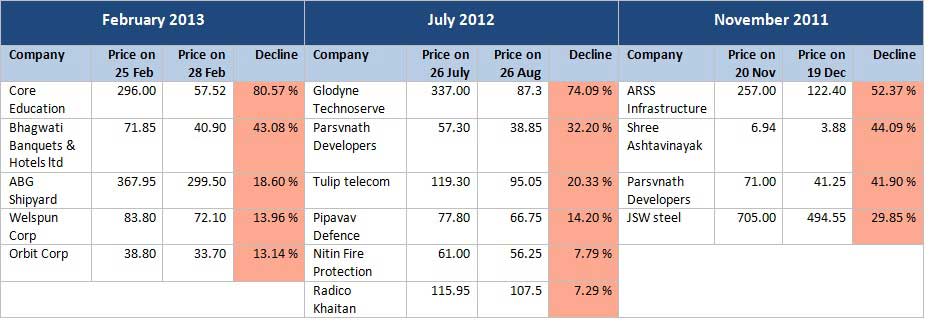
Far too many spend their time, energy and brain in trying to defeat the market or shall I say – in trying to defraud others. May be for this reason, many people look at the stock market as a place where only the well informed insider can make money. While I can assure you that nothing could be further from the truth, in this post I will stick to talking about how the so called operators go about their jobs.
Operator Syndicates
There are many ways by which stock market operators try to make the share price move as they desire. Newer techniques to commit fraud are being devised everyday and even the well informed often fall for them. One of the most common ways in which stock market operator work is by forming a syndicate with each other and targeting companies where a big portion of promoter holding is pledged. Promoters of many midcap companies in India have pledged a large portion of their holding which gives these operators a target rich hunting ground.
The objective is to short sell (selling shares without actually holding them – i.e. on the promise to buy them back in future – if you are wondering how this happens, this is allowed and legal in almost all stock markets of the world) a lot of shares very quickly so that the share price falls sharply. More the price falls, higher the profit they make (since they sell high and can buy back at a lower price hence netting the difference). Further, a sharp fall in the price of the share does 2 things:
- Creates confusion – Investors do not exactly know why the share starts falling but they suspect the worst and start selling just because everyone seems to sell. No one looks at the business or fundamentals of the company once this happens. It’s a free for all sell fest.
- Triggers the margin call – When you trade on margin money, you are taking a leveraged exposure.
Best explained with an example – The trader pledges shares worth Rs 50 and with the Rs 50 margin he so raises, he buys shares worth Rs 200. Now if the price of his purchased shares declines to Rs 150, he will have to deposit more shares (or cash) in his margin account, failing which, the lender will most likely sell the pledged shares to recover the money which he extended. If that happens, the trader’s entire margin amount will be wiped out (i.e. a 25% decline in the value of the purchased exposure in this case, will result in a 100% loss to the trader). Stock market operators try to short sell to the point that the margin exposure taken by the promoter gets wiped out.
Once this happens, a fresh round of sell-off gets triggered by the financier to recover his money. This results in a further crash in the stock price. Often (and not always) this sharp decline in stock price has nothing to do with the fundamentals of a business and is driven purely by the demand-supply pressure being exerted on the stock.
Please don’t take it as me saying that after a sharp crash you should always buy a stock which ‘supposedly’ has good fundamentals or ‘may have been hit’ by operators. On the contrary, avoid companies where the promoters have pledges a huge portion of their holding. A company where the promoter trades with the money he raises by pledging his own holding is not worth your time.
Visit here for a look at the previous bear cartel attacks and a list of companies which got affected.



Excellent knowledge based and educative to someone like me,who trades but with not even half the knowledge and thus loses hard earned money.
Thanks Dalip.
I got your message on my inbox as well. We look forward to your joining us 🙂
Excellent…. 10/10…
Sir, please me… Is Aptus Industries also the part of Operators? Have bought in huge quantity @16/-
I am very much afraid of the lower circuit… Seeking for your advice. Due to limited knowledge of Stock Market, bought it in lower circuit…
Please guide me what to do!
Hi Sarang – Please post your questions in the member section after signing up on – http://www.sanasecurities.com/subscription
Thank you very much for your valuable experience and insights. Great education for people like us.
Thanks Sashank
Hi,
Things for sharing. Now that I am leaving my job, I thought I will say this – most of out tips at btst are based on your recos. 🙂
Really now! That is the best comment I have received so far. Its time you share some profits with me. I wont say no to it!
Nice original thoughts on this subject. I am indebted to you.
Are operators legal?
Do the manipulate big companies stocks too such as Infy, Reliance etc.
Price manipulation is of course illegal. Bigger the company, harder it is to manipulate it but sure it happens.
That’s true. But your post will hugely affect healthy competition in stock market. Without them there’s no game.
Hahahah